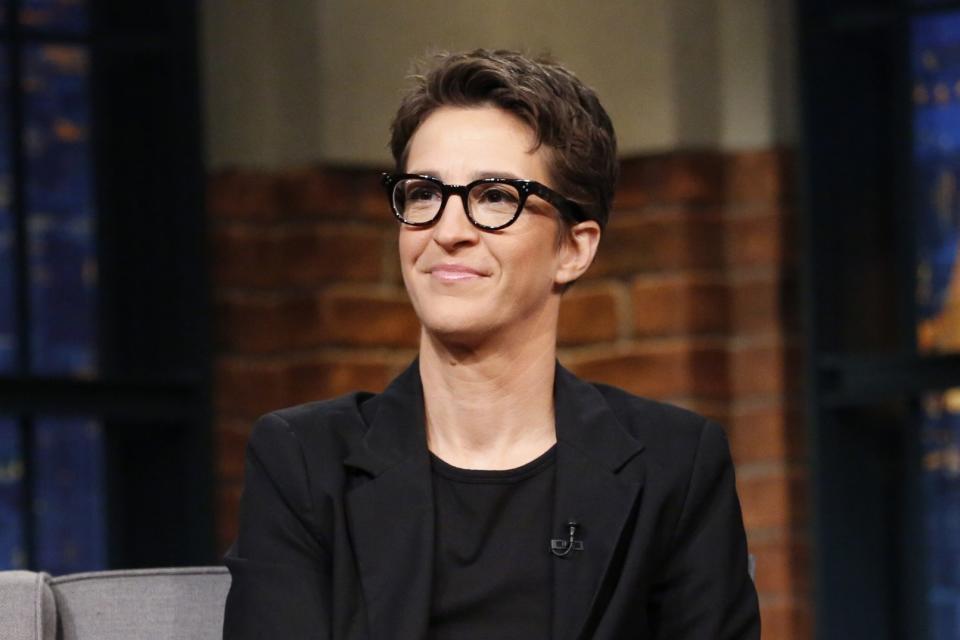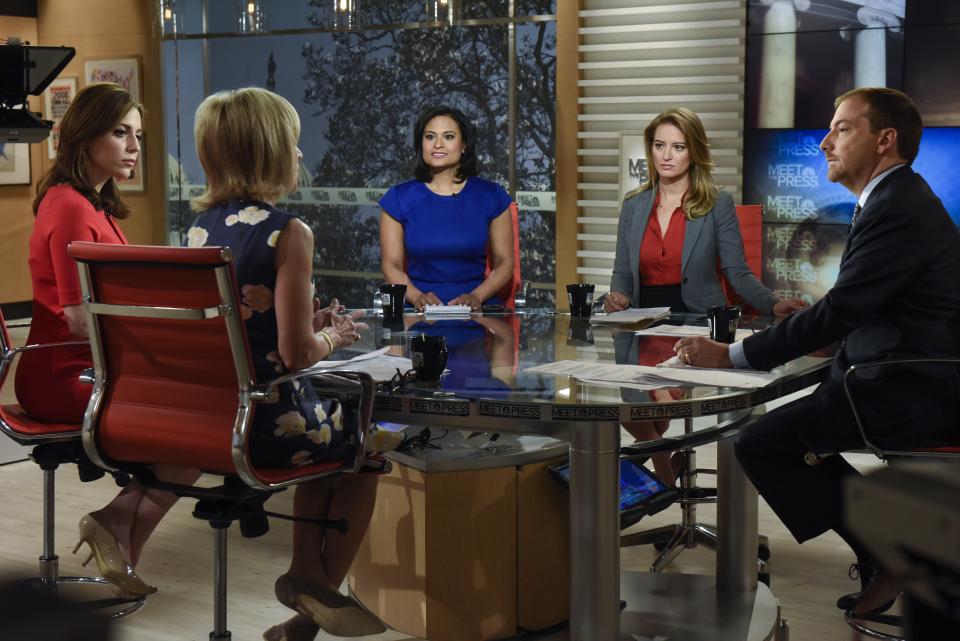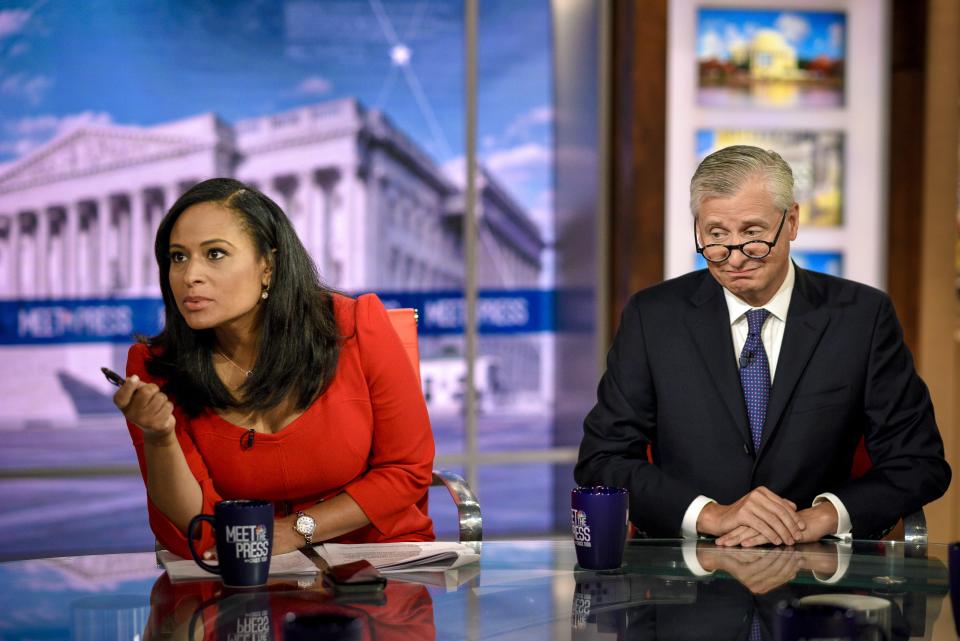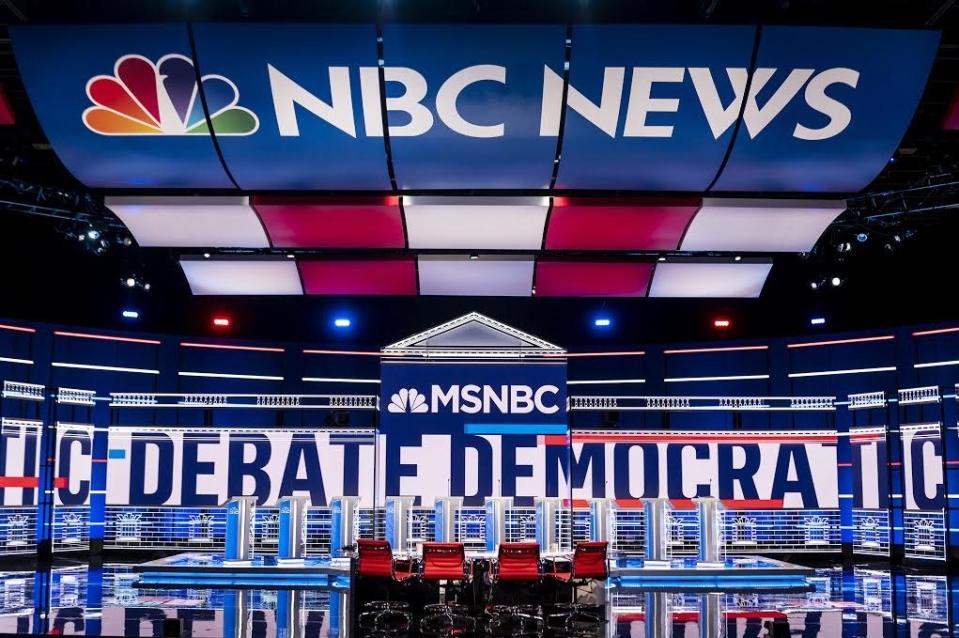Four Seasoned Journalists Will Moderate Tonight’s Presidential Debate—They Happen to Be Women
The four journalists are some of the most practiced reporters and commentators on television. Among them, Rachel Maddow, Andrea Mitchell, Ashley Parker, and Kristen Welker have covered Congress, the White House, presidential races, and the State Department. (Mitchell has herself reported on all four of those beats.) Each is so seasoned she seems to have eliminated verbal tics from her speech—the "um"s and "like"s that mere mortals can’t shake.
But in conversation with them, there are phrases that crop up like punctuation.
It’s the first week of November, and the fifth presidential debate for the Democratic nominee, set to take place in Atlanta, is imminent, hosted on MSNBC with the Washington Post. Late last month the network announced its four moderators—Maddow, who hosts her namesake show on the network; Mitchell, a veteran with the network since 1978; Parker, a White House reporter for the Washington Post; and NBC News White House correspondent Welker.


Meet the Press - Season 72
The top brass went with their finest, of course—a balance of expertise, from Maddow, with her finger on the pulse of Democratic voters, to Mitchell, who is the chief NBC News foreign affairs correspondent, to Parker and Welker, who report on this particular White House on a minute-to-minute basis. (“I've got four of the best journalists ever,” explains Rashida Jones, senior vice president for specials on NBC News and MSNBC. “Andrea and Kristen and Rachel and Ashley—they know how to interview people.”)
And oh, sure. That’s right. All are women.
As Mitchell, Welker, and Parker tell it when we meet at 30 Rockefeller Center in a snug, bright conference room, these three in particular also happen to be friends, with Parker and Welker spending hours racing between their offices and the White House and both appearing on Mitchell’s show, Andrea Mitchell Reports.
And so when the women talk, these are the words that get repeated over and over. Not “uh” or “well,” but: “To Ashley’s point,” “As Kristen said,” “Let me just add about these two,” “I agree with Andrea,” and “No, please. You first.”
What’s it like to be in a room or at a table or on camera with four of the most accomplished women in journalism? Well, there’s a lot of credit to spread around and bottomless praise, and no one interrupts.
Pressed to describe her relationship with her female coworkers, Mitchell observes that the group “tends to be more collegial.” Later she adds: “I don’t want to be sexist, but there is a different feeling in the room when we’re preparing.”
How to sum it up? Mitchell, the consummate journalist, pauses to search for the fairest possible explanation: “There’s just not a lot of testosterone.”
The same cannot be said of the women’s lives, otherwise. As White House correspondents, Welker and Parker spend a considerable amount of time with Donald Trump and his staff. Both have traveled with the president. “There could be no more pressure than what these two women do,” Mitchell insists, with palpable admiration. It’s the ultimate preparation for the debate—which will air tonight on MSNBC and stream on the Post’s website. Mitchell lists the job requirements: Stand up there, get the facts rights, don’t stammer, be prepared for pushback, fight to get a question answered, ask a follow-up, do not back down, do not give an inch.

Meet the Press - Season 68
The work is so relentless that it took Welker a full 20 seconds to recall the last time she had 15 spare minutes to hang out with her husband or—woman of the people—sneak in half an episode of one of her favorite Bravo TV shows. The tweets start at 5 a.m. News breaks round the clock. “I don’t want to sugarcoat it,” says Parker, who has to both meet her deadlines and be back at the house at 6 p.m. on the evenings she’s responsible for child care. (She has an eight-year-old stepdaughter and an infant at home.) “I had a colleague, a wonderful colleague—a young guy, but doesn’t have kids—and he turned to me once as I was running out of the office and said to me, ‘Wow, you’re really committed to leaving at 5:30!’ I thought, I can’t leave a seven-month-old home alone, so, yes, this is a commitment.”
Tonight’s event will mark the third ever all-female moderator lineup in a presidential debate, following Trish Regan and Sandra Smith, who cohosted two Republican debates in 2016 on Fox Business Network, and Gwen Ifill and Judy Woodruff, who teamed up for a Democratic debate in 2016 on PBS. If it were up to Parker, we would soon stop counting them, rendering stories like this one obsolete: “It’s exciting that we are four women, but the true sign of progress is when that is just the norm.”

Meet the Press - Season 72
Welker waits for Mitchell and Parker to finish (no one interrupts), but then breaks in: “Not to embarrass her, but this moment is not possible without Andrea Mitchell, who is one of the people who blazed the trail so that we could have a debate like this.”
Mitchell has glimpsed that platonic future. Once, at one of Madeleine Albright’s parties, Albright told Mitchell about a conversation she’d had when John Kerry was confirmed to her former position in the cabinet. Before him, three out of four of the previous secretaries of state had been women—Albright herself, Condoleezza Rice, and Hillary Clinton. At the time, one of Albright’s granddaughters had turned to her with some surprise: “Granny, can a man be secretary of state?”
Sometimes Mitchell will sit in a room—as she often has in preparation for this debate—and women encircle the table. There’s Jones, the senior vice president for specials on NBC News and MSNBC. But also: Mitchell’s executive producer is a woman. Both Welker and Maddow have female producers. And of course in front of the cameras tonight, it’s a clean sweep. (Behind the scenes, the picture is less triumphant. Earlier this week four contenders—Senators Cory Booker, Kamala Harris, Bernie Sanders, and Elizabeth Warren—sent a letter to the Democratic National Committee to push for an outside review of the workplace culture at NBC News, which has been scrutinized in recent weeks over how its handled sexual harassment and misconduct issues. NBC News has denied the claims and issued no new comment, referring reporters to its previous statements that the division had confidence in the conclusions of its internal review.)
Still, despite the fact that women have risen to positions of power across journalistic outfits, there’s been less forward movement for other kinds of representation. While Welker, who is black, notes that even since the last presidential race, there’s been “an undeniable shift” in the number of women of color in the field, Mitchell notes that Trump “seems to pick on Yamiche [Alcindor], Kristen, other people [of color], disproportionately more than some of the white males.”

Meet the Press - Season 72
“There are still not enough people—men or women—of color,” Mitchell continues. “I don’t think we’ve reached that tipping point at all. There are some times on our broadcasts where I do think afterward, Oh, wow, from our anchor to our White House correspondent to our Capitol Hill correspondent, we’ve had all the prominent stories anchored with people of color. That wouldn’t have happened five, 10 years ago, so at least on an individual basis, it can seem like we’re getting somewhere. But numerically, we’re not. Statistically, we’re not.”
Even so, she’s satisfied that tonight will in some small measure help create “an expectation for people.” That a little girl could see Welker or Parker or Maddow, for that matter, and think, I could do this.
In the meantime, the women remain—as Welker stresses—focused on their work, each having learned to separate a personal desire to be perceived as “nice” from a professional imperative to get the job done. That is, the candidates should come prepared to be pressed. (“We don’t want a B.S. answer,” says Mitchell.)
“She would say to people, ‘Ashley is so fearless she’ll ask anyone anything.’ And what I wanted to say was ‘I’m not fearless, but I’m afraid of disappointing you.”
“I want to be liked,” says Parker. “I’m a people pleaser. If I think my sister is annoyed with me, I’ll text her 200 times.”
But on the clock, it’s a different calculus. Parker’s first job in journalism was under Maureen Dowd, the famed New York Times op-ed columnist. “She would say to people, ‘Ashley is so fearless she’ll ask anyone anything.’ And what I wanted to say was ‘I’m not fearless, but I’m afraid of disappointing you, so I’m going to go out and be the best reporter I can be and do my job, and if that means asking a tough question or asking an uncomfortable question or figuring out someone’s home address and sitting outside their house for four hours so I can can run up to them as they’re trying to race from their car through their driveway to their garage to avoid my question, that’s what I’m going to do.’”
For all four, the paramount relationship to preserve isn’t with a source or a candidate or an elected official or even the president of the United States. It’s with their audience.
“You owe it to your viewers, listeners, readers to get that information,” Mitchell says.
And Welker remembers advice that journalist Soleded O’Brien gave her at the start of her career: “Kristen, the job of a journalist is to listen.”

“It’s about doing your homework, preparing so that you can listen,” Welker says. “Has the candidate answered our question or has the candidate dodged our question? Because if they’ve dodged it, we have to go back.” (Welker points to Mitchell as the ultimate example, recalling a March 2017 press conference during which Mitchell, then 72, was forcibly ejected from a State Department room because she refused to stop asking former Secretary of State Rex Tillerson questions.)
Mitchell, Parker, and Welker won’t get into specifics about what to expect from the debate itself; the topics are likely to change until the last minute (as might their outfits, Mitchell adds). But that faithfulness to the audience drives their approach. When Mitchell was new to broadcast, a news director told her to imagine she was talking to just one person—not millions, but one. "Think of someone," he said. Ever since, she has pictured her mother on the other side of the camera. And Parker credits their shared devotion to the reader—to that one person—for their fierce ambition as well.
“There are no more competitive reporters than the three of us,” Parker says. “I think that’s what’s interesting. It’s not mutually exclusive. You can be supportive and you can be competitive.” You can cheer one another on and make one another better.
Parker once attended a dinner for female journalists in Washington, D.C. The meal was wrapping up around 11 p.m., when news came in about some happening abroad. The waiter came around to take orders for tea or drinks, and Mitchell asked whether the kitchen had an espresso machine. “She wanted to down a shot of espresso so she could go back to the bureau,” Parker remembers. No luck; Mitchell was offered chai tea, instead. Mitchell laughs now, but with a hint of grievance. She wanted that espresso! She had sources to chase.
“One of the great honors of doing this debate is that these three journalists are at the forefront of this field,” Welker says. She recounts a recent marathon debate prep session—the rapid-fire exchange of ideas, the deference, the attention paid to each person and her perspectives. “It lasted for a few hours,” she says, “but I could have gone all night.”
Mattie Kahn is the culture director at Glamour.
Originally Appeared on Glamour

